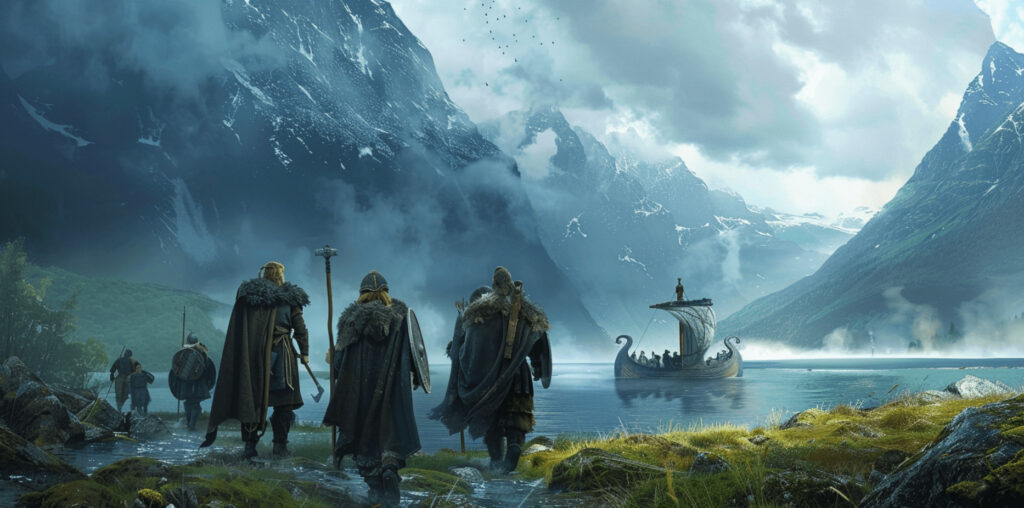Blog, Tales of the Gods
The Vikings: Lessons for Modern Learners from Norse Explorers and Warriors
The Vikings, renowned for their courageous expeditions and formidable fighters, offer loads of lessons for today’s learners. These Viking voyagers and warriors from Scandinavia left an imperishable imprint on history, not only through their victories but also through their effect on trade, navigation, and social setup. This article discusses the varied aspects of Viking life, drawing attention to lessons that stay significant today.
1. Viking Trade Routes: Lessons in Globalization
The Vikings were master traders who created vast trade networks throughout Europe, Asia, and North America. Their skill in navigating and conducting trade extending beyond their native lands illustrates the significance of globalization and economic interrelatedness.
Key Trade Routes
Viking trade routes extended from Scandinavia to the Byzantine Empire, the Abbasid Caliphate, and even as far as North America. Notable trade centers included Hedeby, Birka, and Dublin. These routes facilitated the exchange of goods such as furs, amber, ivory, and silver.
Modern Lessons
Modern learners can draw parallels between Viking trade routes and today’s global economy. The Vikings’ capacity to link far-off markets underlines the value of understanding and exploiting worldwide trade networks. Companies like Amazon and Alibaba indulge in the principles of global trade, much like the Vikings did centuries ago. Exploring historical and contemporary economic strategies can be enriched by collaborating with an essay service like EssayWriterCheap, which provides insights into economic theories and their practical applications in today’s interconnected world economy.
2. Norse Mythology Impact: Cultural and Psychological Insights
Norse mythology, rich with gods, heroes, and epic tales, played a significant role in Viking society. It influenced their worldview, moral codes, and cultural practices.
Major Figures in Norse Mythology
Central figures in Norse mythology include Odin, the Allfather; Thor, the god of thunder; and Loki, the trickster. These gods and their tales provided the Vikings with a structure for understanding their place in the world.
Modern Lessons
The impact of Norse mythology on Viking life offers insights into the power of storytelling and cultural narratives. Modern learners can appreciate how mythology shapes cultural identity and societal values. Getting a handle on these narratives can strengthen psychological pliability and promote a deeper relationship with cultural heritage. Companies like Disney have effectively exploited mythological themes to create persuasive stories that resonate universally.
3. Viking Military Tactics: Strategy and Innovation
Viking military tactics were renowned for their effectiveness and innovation. Their strategies in warfare have been studied for centuries and continue to offer valuable lessons in leadership and tactical planning.
Key Tactics
The Vikings utilized diverse tactics such as the use of longships for prompt coastal attacks, the shield wall establishment in battle, and the element of surprise. Leaders like Ragnar Lothbrok and Harald Hardrada were famous for their tactical mastery.
Modern Lessons
Contemporary military and business leaders can learn from Viking military tactics. The focus on adaptability, tactical planning, and origination is essential in today’s fast-moving surroundings. Companies like Google and Apple, known for their groundbreaking approaches, reflect the Viking spirit of resilience and strategic performance. Understanding the parallels between historical tactics and modern business strategies can be insightful. For comprehensive insights into strategic business practices, platforms like EssayLTD.com offer valuable resources and analyses that bridge historical lessons with contemporary business challenges.
4. Scandinavian Societal Structure: Governance and Social Cohesion
The societal framework of the Vikings was well-structured, with an accent on governance, social unity, and legal systems. This framework enabled them to uphold discipline and guarantee the success of their communities.
Key Aspects
The Viking societal structure was characterized by local assemblies known as Things, where free men could voice their opinions and settle disputes. Social hierarchies included kings, jarls (nobles), karls (freemen), and thralls (slaves).
Modern Lessons
The emphasis on governance and social cohesion in Viking society offers lessons for modern organizations. Democratic principles and inclusive decision-making processes can enhance organizational effectiveness and employee satisfaction. Companies like IBM and Microsoft promote open communication and inclusive leadership, reflecting these Viking principles.
5. Viking Navigational Skills: Mastery of the Seas
The Vikings were unparalleled navigators, known for their ability to traverse vast and treacherous seas. Their navigational skills were essential for their exploratory and trade endeavors.
Key Techniques
Viking navigational skills included the use of sunstones to locate the sun on cloudy days, detailed knowledge of the stars and ocean currents, and the construction of advanced longships like the Drakkar. Figures such as Leif Erikson, who reached North America long before Columbus, exemplify these skills.
Modern Lessons
Modern learners can draw inspiration from Viking navigational skills in mastering their own fields. The consequence of constant learning, technological invention, and the guts to explore new frontiers is clear in today’s speedily developing world. Companies like SpaceX and Tesla, led by seers like Elon Musk, incorporate the spirit of examination and innovation that the Vikings championed.
Statistical Insights and Modern Applications
- Economic Impact: The extensive Viking trade networks contributed significantly to the economy of medieval Europe. Modern parallels can be seen in how global trade networks today drive economic growth.
- Cultural Influence: Norse mythology continues to influence popular culture, from literature and film to video games. Understanding these cultural roots can enhance creative industries.
- Strategic Advantage: The tactical innovations of the Vikings are studied in military academies and business schools alike, underscoring their lasting relevance.
Conclusion
The Vikings, with their phenomenal trade ways, rich mythology, original military strategy, structured society, and outstanding navigational capabilities, offer ageless lessons for current learners. Through examining these facets of Viking life, we can develop valuable insights into global integration, cultural resilience, strategic innovation, governance, and exploration. These lessons, based on the adventures of Norse explorers and warriors, keep resounding in today’s unified and quickly changing world.

